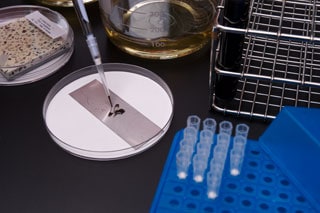Disinfectant tests are used to validate sanitizing agents for effectiveness against organisms, which is an increasing area of concern to manufacturers and regulatory agencies. Disinfectant efficacy must be established before a new disinfectant can be put on the market. The goal of a disinfectant efficacy study , also known as a coupon test, is to provide evidence that internal cleaning and disinfecting procedures result in a clean and safe manufacturing environment. These studies support cleaning tests by demonstrating that the application of the disinfectant diminishes or eradicates microorganisms, however they should not be considered a substitute for validating that cleaning agents are acceptable. Additionally, manufacturers must validate disinfectant regimens for cleanrooms and other controlled areas.
Materials tested typically include household and industrial disinfectant agents, sporicides, fungicides, and hand sanitizers. Disinfectant testing is conducted per many different standards including The Official Methods of Analysis of AOAC International and USP General Chapter 1072. We are highly experienced in performing general disinfectant efficacy tests to establish kinetic kill curves for a large variety of organisms. We additionally provide Virus and Virucidal testing, which measures the efficacy of disinfectant claims on virus killing. This virus testing is done in compliance with ASTM E 1052 and ASTM E 1053.
BioSafety Level – 3 and Biofilm Efficacy Testing
Our Bozeman, MT facility offers specialized micro-organism validations for disinfectant efficacy validations. The facility hosts a state-of-the-art, Biosafety Level – 3 lab (BSL-3) providing disinfectant efficacy evaluations against the most relevant emerging pathogens. From resistant bacterial strains to viral pathogens (such as SARS-CoV-2), the micro-organism portfolio available at the Nelson Labs Bozeman BSL-3 lab provide you access to product validation against the most relevant micro-organisms today.
Our Bozeman, MT facility also offers a comprehensive Biofilm efficacy testing service to support your process and contamination control strategy. Our team of biofilm experts, lead by Margaret Butler Ph,D, have worked on some of the most complex biofilm efficacy evaluations and are prepared to offer this expertise to you. Using ASTM methods, customized experiments, and regulatory insight, Nelson Labs Bozeman can help you generate the data needed to support your anti-biofilm claims, such as biofilm kill, removal, and prevention.
For Viral, BSL-3, or Biofilm efficacy evaluations, please contact our team at Nelson Labs Bozeman here.
Applicable Standards
- The Official Methods of Analysis of AOAC International
- USP General Chapter 1072



